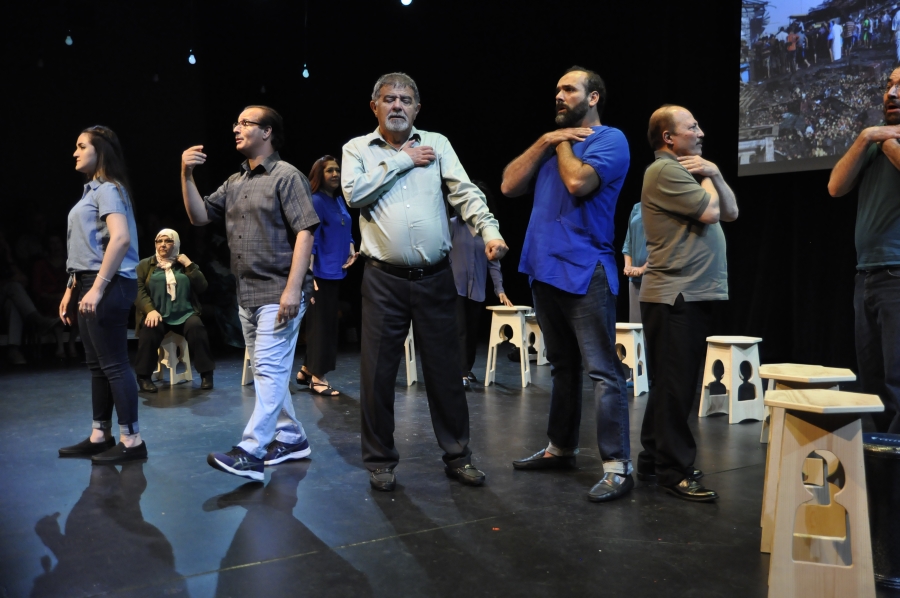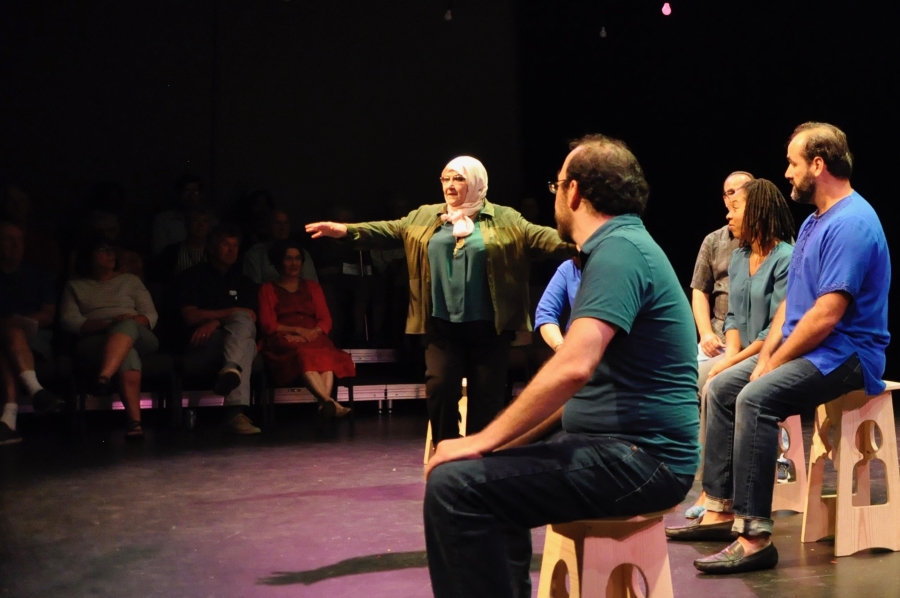How do theatre artists make art in this era of hate? A touring production of Birds Sing Differently Here, created by a cohort of Iraqi immigrants and refugees living in Minnesota, provides one answer. The mix of storytelling, movement, poetry, and music—a collaboration with director Taous Claire Khazem and playwright Dylan Fresco—combats ignorance with empathy by sharing a heartfelt, often funny, narratives of love, loss, war, and finding a place to call home.
The impetus for the tour came from the Iraqi participants themselves. After the piece was initially presented at the Guthrie Theater of Minneapolis’s Dowling Studio in 2017, the performers wanted to bring the show to a broader audience. On July 18 and 19, the play, produced by the Iraqi and American Reconciliation Project (IARP), was staged in St. Cloud, Minn., at Great River Educational Arts Theatre’s (GREAT) Helgeson Learning Lab Theatre. Birds Sing Differently Here next performs at the Southern Theater in Minneapolis July 25 and 26.
St. Cloud, Minn., was highlighted last month in a viral New York Times article that showcased efforts by some in the city to pressure the mayor and the city council to prevent immigrants and refugees from settling there. The intolerance evident in that piece spoke to the growing xenophobic sentiment that seems to be growing stronger every day across the U.S.
Vicki Morgan, one of the co-founders of the Morgan Family Foundation, which supported the touring production, believes in the power of stories to change minds. Morgan is a regular at GREAT and tells stories herself through scrapbooking. “I think that stories are what make the difference,” Morgan remarked after the performance in St. Cloud. “To tell these stories—that’s what touches people’s hearts.”
The play doesn’t preach or proselytize; rather, in Khazem and Fresco’s capable hands, the narratives are woven together using both English and Arabic, performed by a mix of professional actors and Iraqi American participants who share their own stories onstage. With a simple set consisting of carved wooden stools, the performers bring to life stories about prewar Iraq and wartime strife and grapple with their new home in Minnesota, where things just don’t quite feel the same as home. Even the sounds the birds make are different, as are the color of the leaves—not to mention all that snow.
One particularly charming story featured in the play is that of Hannaa Al-Azzawi and Adil Naji. The couple fell in love while in school, but were forbidden to wed by Al-Azzawi’s parents. After years of secretly courting, they finally got married after an uncle intervened. Later, when they moved to Minnesota, they would go to Panera Bread and order chicken soup. Once, Al-Azzawi asked her husband why he always orders the same item, to which he replied, “Because the only thing I can say [in English] is chicken soup!” Perhaps it’s the universality of Al-Azzawi and Naji’s affection for each other that makes their story so compelling.
Groups like #UniteCloud; Catholic Charities of the Diocese of St. Cloud, Minn.; Arrive Ministries; and the Center for Victims of Torture (CVT) partnered with IARP to spread the word about the St. Cloud performances. Sisters Lucy and Helen Latara from South Sudan, for example, heard about the show through their work with Lutheran Family Services. “Storytelling is a healing process,” shared Helen Latara. “It’s a type of advocacy to create awareness for others to understand.”
Kahin Adam, a Somali refugee who works at CVT, said he found the play healing, especially as someone who faces discrimination. “Every day is a struggle,” he said. “You are discriminated being Black, and then discriminated having an accent, you are discriminated being Muslim, and then discriminated not being an American citizen. The more people find out, the more discrimination there will be.”
For Adam, the play is important because it helps create a more truthful narrative of refugees and immigrants. “It’s important that there’s a human side of the story. This is the human side of the war.”
Maha Alazzwi, an Iraqi American living in St. Cloud, served as a panelist for a post-show discussion after the Friday night performance, and said that the play touched her heart. “It’s good for the community to know all this reality instead of just taking the picture from the news about how all Muslims are terrorists, or they come here just to damage our community,” she commented. “The people come here just because they are looking for peace, for happiness, for a good life.”

Meanwhile, educators in attendance at that Friday show are hatching plans to bring what they’ve learned from the play into their classrooms. Angela Harvala, who teaches middle school in Princeton, 30 minutes outside of St. Cloud, came with two other teachers who wanted to see the play to expand their cultural understanding.
“What struck me while watching this performance was that the idea of sharing stories is so important,” said Harvala. “To be able to do that through theatre and to be able to share stories in such an impactful way could really change the narrative in our community, for our kids, and for their parents. As polarized as we’ve become as a nation, it’s so important to be able to use those connections and connect kids to stories.”
Another teacher, Brenda Baird, said that many in their community believe hyped-up stereotypes. “We’re trying to give our kids the opportunity to be exposed to not just that single story of that stereotype, but to see the other stories of other groups of people,” said Baird.
Meanwhile, the piece brought up emotions for at least one veteran in attendance. During the post-show discussion, Denise Todd said that the experience of dropping bombs in Iraq was traumatic for her and her husband, who both served in the Iraq War. “The people down on the ground—they were just numbers,” she recalled. “You just drop the bomb and keep going.”
In a follow-up interview, Todd shared that it is often kids right out of high school who are assigned brutal tasks like looking at a computer screen and deciding when someone dies. “We were taught a lot to dehumanize the people that we were dropping bombs on to keep us safe,” said Todd.
Dehumanization is what propels war, and even makes it possible. It’s also central to the kind of hate that propels people at a rally to chant “Send her back” when the U.S. president criticizes the only Black Muslim woman in the House of Representatives. If those individuals had the opportunity to actually get to know someone’s story, to hear, for example, Adil talk about the joy he finds in growing things in the garden, perhaps it might quell some of that rage.
As the tour started wrapping up performances around the state, Khazem said the performers are ready to go national. “They’re asking, ‘When are we going to Washington, D.C.?’” said Khazem. When indeed.
Sheila Regan is a freelance arts journalist and critic based in Minneapolis.


